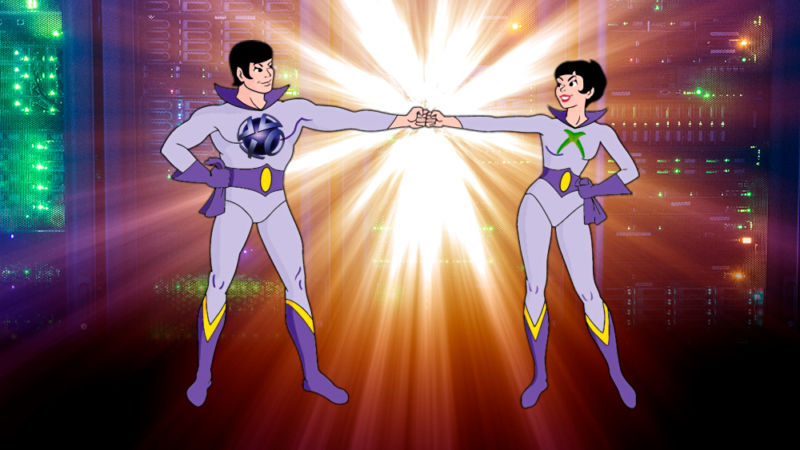
In a rare move, console rivals Microsoft and Sony announced a major collaboration on Thursday to join forces on a potentially huge new gaming sector: the cloud. The companies announced today that they have entered into a "memorandum of understanding" to "explore joint development of future cloud solutions in Microsoft Azure to support their respective game and content-streaming services."
The surprise move is the closest sign of collaboration between two fierce competitors in the console-gaming space, but it is probably not a sign that they will stop being competitors any time soon.
As part of the agreement, Sony will still use Microsoft's Azure servers and data centers for its own game and content-streaming services. That presumably includes PlayStation Now—the Sony game-streaming service launched in 2014 after Sony's 2012 acquisition of streaming company Gaikai—and PlayStation Vue, the company's Internet-based cable TV alternative.
Microsoft is already planning to utilize Azure as part of its own Project xCloud service for game streaming. That could play into a split hardware plan that Microsoft alluded to at last year's E3, with a high-end console for top-of-the-line local gaming and streaming gaming content that can also run on all sorts of other devices.
The companies also agreed to "explore collaboration in the areas of semiconductors and AI," but the announcement's mention of "joint development of new intelligent image-sensor solutions" suggests this might have more to do with the Azure Kinect sensor than anything gaming-related.
Don’t worry, they’re still competitors
Seeing two fierce console competitors announce a gaming partnership makes it easy to jump to conclusions about what the future of the gaming market might look like. We're sure there will be countless speculative articles and YouTube videos opining on how this partnership portends the "End of the Console Wars" for these two companies. We can practically hear the keyboards typing out supposed details of some imagined joint Microsoft/Sony streaming service allowing owners of either PlayStation or Xbox hardware (and quite possibly other devices) to play games streamed through a single server platform under a single Netflix-style subscription.
In this console-gaming Shangri-La, the idea of a console game "exclusive" would disappear as Sony and Microsoft both publish their major franchises directly to a joint streaming service for everyone to enjoy. Finally, Gears of War and Uncharted on a single platform, playable on a cheap streaming box or a mobile phone!
There's some twisted logic to this idea. Google's March announcement of its Stadia service and reports that Amazon is planning a similar play have convinced a large segment of the industry that remote streaming is gaming's inevitable future. The prospect of impending competition from such Internet giants could be enough to get former rivals to work together to hold onto a joint position in the marketplace. And considering how similar the current Xbox and PlayStation consoles are on an architectural level, teaming up for a single "dual-console" streaming standard might make some sense.
On the other hand, this kind of major shift in direction seems like an unlikely move for the two entrenched console giants. Consider the PlayStation 4 follow-up that Sony recently teased with promises of faster SSD storage, 3D positional audio, and state-of-the-art CPU and GPU hardware. The mere existence of such a console stands counter to the play-even-on-cheap-hardware ethos of efforts like Stadia. And a console like that is going to need exclusive games to convince people to buy it, making it unlikely that Sony would be willing to just give up that software exclusivity for a "let's all work together" streaming service.
“Deep into architecting”
Microsoft, similarly, has already hinted that it is "deep into architecting the next Xbox consoles" that will "set the benchmark for console gaming." Why bother doing that if you're just going to put the next Halo game on a service that's fully accessible to people who buy the competing console (or no console at all)?
The most direct reading of today's announcement could just be an acknowledgement of Sony and Microsoft's respective strengths. Sony has a head start in the streaming-content game via its PlayStation Now and PlayStation Vue brands. Microsoft, on the other hand, has a wider geographic distribution of Azure data centers than competitors Amazon and Google. Given how sensitive game-streaming services are to latency issues, this makes Azure uniquely well-suited as a platform for Sony to stream its PlayStation content to users.
Maybe it would be better for everyone if Microsoft and Sony stopped trying to sell proprietary hardware altogether and simply embraced a supposed streaming utopia, where all games are just playable on practically all Internet-connected devices (never mind the continuing concerns about latency, Internet infrastructure, and cost).
But this is wishful thinking. Both Sony and Microsoft are working on their next generation consoles with state-of-the-art hardware, making it clear that they see premium, high-end consoles, and the platform exclusives used to shift them are here to stay. Despite today's announcement, we don't see Microsoft and Sony linking arms and putting a halt to the console wars any time soon.
reader comments
86